
The Minnesota State High School League (MSHSL) is a voluntary, non-profit association for the support and governance of interscholastic activities at high schools in Minnesota, United States. The association supports interscholastic athletics and fine arts programs for member schools. Membership includes nearly 500 schools, including special schools, home schools, and 435 high schools. The State High School League is an affiliate of the National Federation of State High School Associations (NFHS).

Suncoast Community High School is a public magnet high school in Riviera Beach, Florida. The school's campus was built in 1955 as Riviera Beach High School. It was desegregated in the 1960s and renamed in 1970. It became a magnet school in 1989 and has selective admissions.

The National Federation of State High School Associations (NFHS) is the body that writes the rules of competition for most high school sports and activities in the United States. NFHS's headquarters are located in White River State Park in Indianapolis, Indiana.
Christopher Columbus High School is a private, Roman Catholic, college-preparatory high school, conducted by the Marist Brothers in the Westchester census-designated place of Miami Dade County, Florida. It was established in 1958 and was taken over by the Marist Brothers in 1959. It has over 100 teachers, administrators, faculty, staff, and an enrollment of 1,700 students. It was selected, for the fourth time in a row, as one of the "Top 50 Catholic High Schools" in the United States by the Catholic High School Honor Roll in 2008.
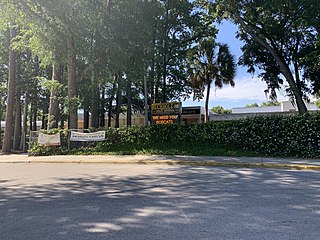
F. W. Buchholz High School is a high school in Gainesville, Florida, United States. Buchholz is one of seven high schools in Alachua County. Opened in January 1971, it is the largest public high school in Gainesville, with 2,241 students in 2020. The Buchholz Math Team was dubbed "America's Greatest Math Team" by The Wall Street Journal in 2022, when Buchholz won first place for the 14th time in the annually held national Mu Alpha Theta math competition.

Booker T. Washington Senior High School is a normal four year High School located at 1200 NW 6th Avenue in Miami, Florida, United States. It is located in the Overtown neighborhood, and serves families in the Overtown, Downtown, Park West, and Arts & Entertainment District neighborhoods. Its principal is Kevin E. Lawrence.
Glades Day School is a K-12 private school in Belle Glade, Florida. It is accredited by the Florida Council of Independent Schools. It was founded in 1965 as a segregation academy by white parents in response to the court-ordered desegregation of Palm Beach public schools. It opened as Pahokee Day School and was renamed in 1967 as Day School of the Glades when it purchased and renovated the former Everglades Memorial Hospital in Pahokee.

Leon High School is a public high school in Tallahassee, Florida, United States. It is the oldest public high school in the state, and is a part of the Leon County Schools System.
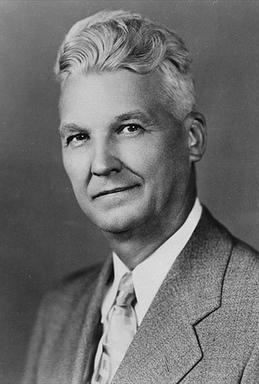
Henry Van Arsdale "H. V." Porter was an American educator, coach, and athletic administrator. He served as the executive secretary of the National Federation of State High School Athletic Associations from 1940 to 1958, and prior to his appointment managed several Federation projects while still working for the Illinois High School Athletic Association. Porter was involved with several sports but had special influence on basketball. He served with Oswald Tower on the National Basketball Committee of the United States and Canada for 26 years and was instrumental in the development of the rules films, the fan-shaped backboard, and the molded basketball, which replaced the earlier laced model. He is also credited with popularizing the term "March Madness" through an original essay he wrote in 1939 and a later poem distributed to the various state high school associations and widely republished. In 1960 Porter was inducted into the Naismith Memorial Basketball Hall of Fame in its second class.
George D. Chamberlain High School is a public high school in Tampa, Florida, United States. It was opened in 1956 on North Boulevard. The school is named in honor of George D. Chamberlain, who served for several years as a trustee for the Hillsborough County School System.
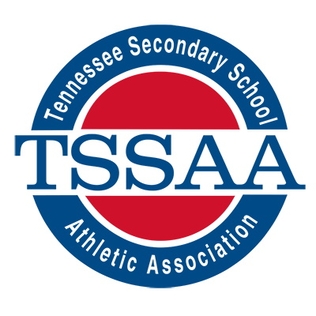
The Tennessee Secondary School Athletic Association (TSSAA), along with the affiliated Tennessee Middle School Athletic Association (TMSAA), is an organization which administers junior and senior high school sporting events in Tennessee. The TSSAA is the only high school athletic organization in the United States to have a five-sport, Olympic-style spring sport championship tournament, known as Spring Fling, for baseball, softball, track and field, team and individual tennis, and soccer. Spring Fling began in Chattanooga in 1993, later moving to Memphis, and then establishing itself in Murfreesboro. The TSSAA was one of the first high school athletic organizations to host a central site for football championships, beginning in 1982.
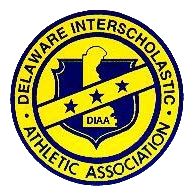
The Delaware Interscholastic Athletic Association (DIAA) is an organization that oversees and regulates interscholastic athletics in the US State of Delaware. The DIAA is headquartered at the John W. Collette Education Resource Center in Dover.
Edgewater High School is a public secondary school located in the College Park section of Orlando, Florida. It is operated by the Orange County Public Schools system. The athletic teams are known as the 'Fighting Eagles' with colors red and white.
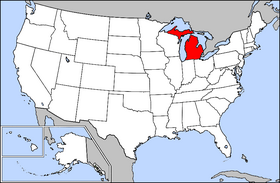
The Michigan High School Athletic Association (MHSAA) is a service organization for high school sports in Michigan and is headquartered in East Lansing. It is a member of the National Federation of State High School Associations (NFHS).

Dr. Phillips High School is a public high school in Dr. Phillips, Florida, United States, near Orlando.
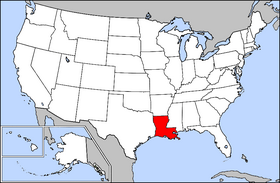
The Louisiana High School Athletic Association (LHSAA) is the agency that regulates and promotes the interscholastic athletic competitions of all high schools in the state of Louisiana.
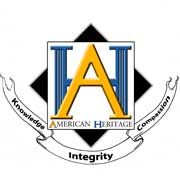
American Heritage Schools are a pair of private, college preparatory, independent, nonsectarian, and co-educational day schools for grades Pre-K 3 through 12. The two campuses together teach 4,200 students and are located in the United States in Plantation, Florida, a suburb just west of Fort Lauderdale in Broward County, and in Delray Beach, Florida, a city just north of Boca Raton in southern Palm Beach County.
Bishop McLaughlin Catholic High School (BMCHS) is a private high school located in northern Pasco County, Florida, United States, not far from Spring Hill, in the Diocese of St. Petersburg. BMCHS is fully accredited by the Southern Association of Colleges and Schools (SACS), and also holds memberships in the National Catholic Education Association (NCEA) and the Florida High School Athletic Association (FHSAA).

The King's Academy is a private, Christian, coeducational, pre-kindergarten through grade twelve, college-preparatory school located in West Palm Beach, Florida. Established in 1970, it is run by an independent board of governors.
The Florida Interscholastic Athletics Association was, during segregation, the organization of the athletic programs black high schools in Florida. It divided schools into classes to match teams from similar schools, and set up game schedules. It existed from 1932 — earlier than that there were too few black high schools — to 1968, when Florida schools integrated.














